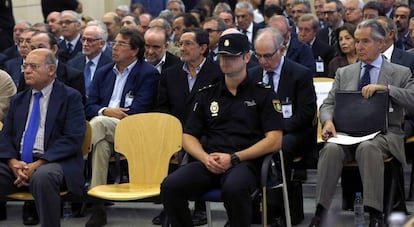Spain’s Supreme Court upholds conviction against ex-IMF chief Rodrigo Rato
Former banker and politician told to serve more than four years in prison over corporate credit card scandal

The Spanish Supreme Court has upheld a four-and-a-half-year prison conviction against Rodrigo Rato, a former banker, International Monetary Fund (IMF) chief (2004-2007) and deputy prime minister of Spain between 2003 and 2004.
In February 2017, Rato was found guilty of embezzlement in a high-profile case involving corporate credit cards used by top executives at the lenders Caja Madrid and Bankia, which Rato headed between 2010 and 2012.
Rato could still file an appeal at the Constitutional Court
Another 64 former bank execs and board members received varying sentences from the Audiencia Nacional, Spain’s High Court, after it emerged that the group had spent a collective €12.5 million between 2003 and 2012 on personal expenses ranging from vacations and jewelry, to meals in expensive restaurants. Everything was paid for with credit cards unofficially offered to them by the heads of the Caja Madrid savings bank, then later at Bankia, the lender that was created after the merger of seven struggling regional banks. Bankia itself was nationalized in May 2012.
The top convictions were for former Caja Madrid chairman Miguel Blesa, who was sentenced to six years in prison, and for his successor Rodrigo Rato, who appealed the decision. But on Wednesday the Supreme Court confirmed Rato’s conviction, meaning that the once-powerful politician will in all likelihood have to report to prison in the coming days or weeks. The Spanish criminal code only allows for the suspension of convictions of two years or less.

Rato, however, could still file an appeal at the Constitutional Court, which would put his prison term on hold until the case is reviewed – if the court accepts his challenge in the first place. Rato’s situation is reminiscent of Iñaki Urdangarin’s: in June, the husband of Princess Cristina and brother-in-law of King Felipe VI exhausted all his appeals and was forced to report to prison to serve a term of five years and 10 months in connection with the Noos embezzlement case.
In its Wednesday decision, the Supreme Court said that Rato consciously maintained a system of secret bonuses for executives that had been established in 1988, “and even rolled it out it to other individuals.”
When the scandal broke, executives claimed that the credit cards were a bonus on top of their salaries, even though there was no written record of their existence on job contracts. Nor was the extra income reported to the tax authorities. The story of lavish spending by bank officials appointed by unions and political parties was especially infuriating for Spaniards who were struggling through the worst economic crisis in living memory.
Rato served as economy minister and later as deputy prime minister under Popular Party (PP) administrations. He was expelled from the conservative group in late 2014 over the credit card scandal. Rato was also briefly arrested in April 2015 in a separate case involving personal tax fraud and money laundering.
English version by Susana Urra.
Tu suscripción se está usando en otro dispositivo
¿Quieres añadir otro usuario a tu suscripción?
Si continúas leyendo en este dispositivo, no se podrá leer en el otro.
FlechaTu suscripción se está usando en otro dispositivo y solo puedes acceder a EL PAÍS desde un dispositivo a la vez.
Si quieres compartir tu cuenta, cambia tu suscripción a la modalidad Premium, así podrás añadir otro usuario. Cada uno accederá con su propia cuenta de email, lo que os permitirá personalizar vuestra experiencia en EL PAÍS.
¿Tienes una suscripción de empresa? Accede aquí para contratar más cuentas.
En el caso de no saber quién está usando tu cuenta, te recomendamos cambiar tu contraseña aquí.
Si decides continuar compartiendo tu cuenta, este mensaje se mostrará en tu dispositivo y en el de la otra persona que está usando tu cuenta de forma indefinida, afectando a tu experiencia de lectura. Puedes consultar aquí los términos y condiciones de la suscripción digital.








































